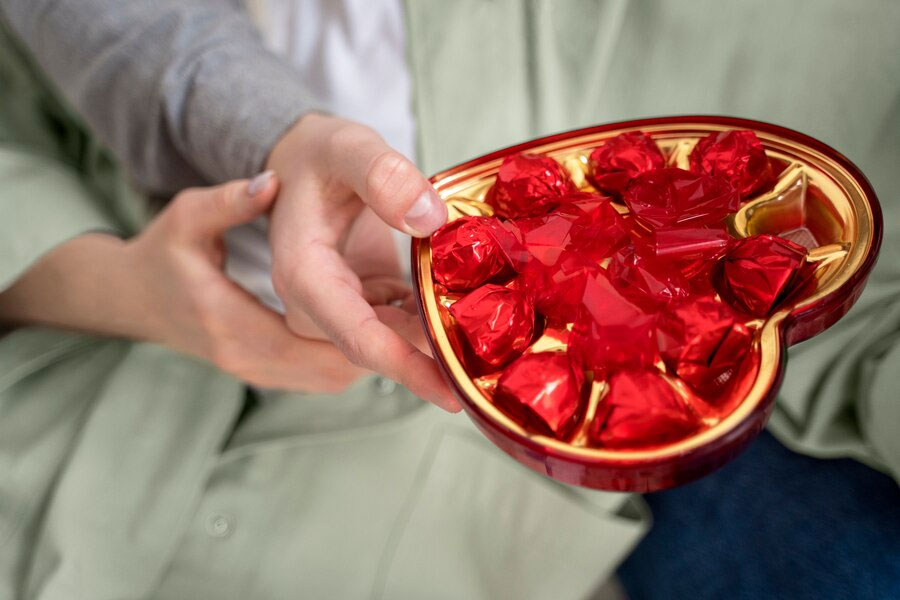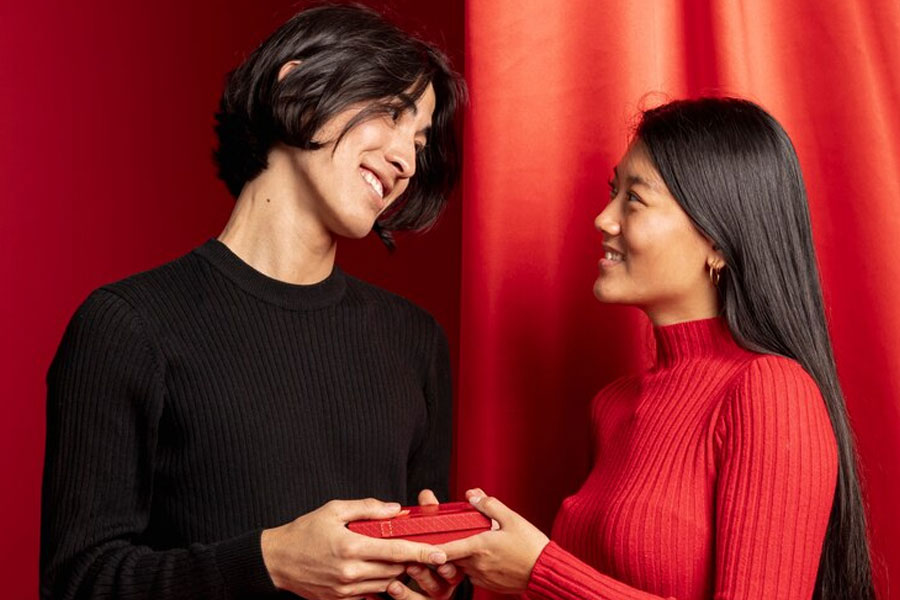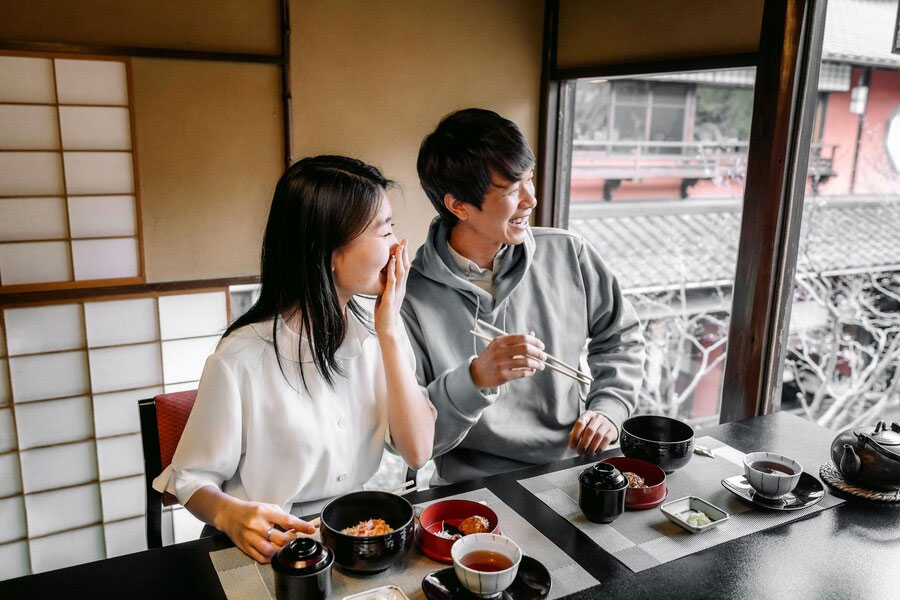

Valentine's Day is a well-known event in many countries, including Japan. However, it is celebrated differently in this part of the world. Whether you are in a cross-cultural relationship or are inspired by Japanese customs, exploring Japanese Valentine's Day traditions can be a meaningful way of celebrating this festival of love with your partner.
Once you figure out these customs, you will appreciate Japanese relationships and subtle cultural differences. At Transpacific Marriage Agency, where understanding between partners from diverse cultures is a priority, we usually find that sharing customs is one of the easiest and most touching ways to connect.
Below, we are going to reveal the endearing specifics of Japanese Valentine's Day and give you some valuable tips for celebrating it in a way that reflects its unique spirit.
It is widely known that the Valentine's Day celebration in Japan is incomplete without gifting chocolates. However, there is a twist to this custom. In many nations, Valentine's Day is a time for exchanging gifts between partners, but it is a bit different in Japan. Here, women are more likely to give chocolates to men.

As “Giri” signifies obligation, these chocolates are offered to coworkers, bosses, classmates, and other acquaintances. With no romantic overtones, Giri Choco is a means of showing goodwill and appreciation. Typically, they are simple and reasonably priced chocolates with no deeper significance.
The relationship starts to grow here. A woman's love interest receives an Honmei Choco, which is often prepared with special attention to detail. To give a more intimate, sentimental touch, some women even go over and above by making these chocolates themselves.
The difference between Giri Choco and Honmei Choco illustrates Japan's considerate and polite approach toward relationships. Rather than being delicious gifts, chocolates have transformed into a language of emotion, care, and thankfulness.

In Japan, Valentine's Day is not a one-sided celebration. White Day, a festival for males to return the gifts and affection given on Valentine's Day, falls on March 14th, exactly one month later.
On this Day, men react to the chocolates they received on February 14th. The custom encourages them to return gifts that are two to three times as valuable as what they received exactly one month before. Their gifts are usually in the form of white-themed treats like cakes, cookies, or marshmallows (thus the name “White Day”).
Of course, sentiments are more important than the cost, which is why considerate actions are equally, if not more, valuable.
If you and your significant other want to incorporate Japanese customs into your Valentine's Day celebration, here are a few considerate and useful ideas. These notions are especially meaningful for couples who wish to expand their understanding of Japanese culture.
The tradition says that Japanese women make chocolates for men, but there is no hard rule that prevents both partners from turning this custom into a shared endeavor. Take some time to try out recipes for handmade chocolates. You can also make creatively designed goodies for one another.
You and your partner may get into the holiday spirit with a romantically inclined dinner that includes Japanese cuisine. Think of preparing meals together, such as ramen, sushi, or a comforting Japanese hotpot (nabe). For dessert, you can make something special with chocolate, such as a Japanese-style chocolate mousse or matcha-flavored chocolates.
You can add a thoughtful and personal touch to your gift by adding a handwritten love note to it. This will be in line with the intention and care represented by Honmei Choco. Write some heartfelt words expressing your love and gratitude for your partner in a simple yet meaningful way.
If you are in a cross-cultural relationship, spend some time learning and discussing the ways Valentine's Day is observed in each of your cultures. By sharing these customs, you can strengthen your bond and gain a better knowledge of each other's backgrounds. For couples assisted by organizations like Transpacific Marriage Agency, which excels at promoting intercultural harmony, blending customs on special events like Valentine's Day may become a festivity of your unique story.
If you are the one getting gifts on Valentine's Day, take advantage of March 14th to give back in a way that will surprise and excite your significant other. You can plan an activity or create a gift reflecting your gratitude. Remember that thoughtfulness matters, not the size of your gift.
Although White Day and chocolates are staples of Japanese Valentine's Day customs, couples also use the occasion to make unique memories. Here are a few more suggestions to help you celebrate your relationship, whether you are in Japan or anywhere else:
Popular locations for couples to walk hand in hand include Tokyo's Odaiba waterfront and Kyoto's Philosopher's Path. If you are out of Japan, you can visit a scenic spot or other beautiful place to spend time together.
In addition to sweets and chocolates, you can exchange traditional Japanese gifts. For example, Japanese calligraphy, handcrafted items, or even small charms for good fortune.
If you are not in Japan but still want to experience its culture, take your partner to a Japanese-themed garden, watch a movie by a famous Japanese filmmaker, or have tea at a local tea house.
When you incorporate traditions into your relationship, you succeed in building unique and lasting bonds. The Transpacific Marriage Agency believes that when you follow the Japanese approach to Valentine's Day, you don’t just exchange gifts but share a piece of your heart.

Japanese Valentine's Day customs provide an intriguing glimpse into how love and affection are expressed. By incorporating these traditions into your relationship, you will create a joyous and meaningful celebration. Such celebrations are of even greater significance for couples in cross-cultural relationships, such as those supported by the Transpacific Marriage Agency. They turn into opportunities to respect each person's heritage while creating customs that are exclusively yours.